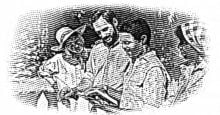04: Evangelism & Witnessing as a Lifestyle – Teaching Plan
 Key Thought : The work of the Holy Spirit in our hearts is shared by the ways in which we live in loving and compassionate service to others.
Key Thought : The work of the Holy Spirit in our hearts is shared by the ways in which we live in loving and compassionate service to others.
[Teaching plan for “Evangelism and Witnessing as a Lifestyle” April 23, 2012]
1. Have a volunteer read John 13:35.
A. Ask class members to share a short thought on what the main idea of this text is.
B. Does loving one another in the church mean that we don’t have differences of opinion, politics, personality clashes, likes and dislikes? How do we deal with these issues in a Christian manner?
C. Personal Application: In what practical ways do we show love for one another in the church family? Share an example.
D. Case Study: One of your relatives states, “I’ve seen a lot of Christians who fight, steal, cheat, and act unkind to others. There’s so much bogus Christianity that it gives Christ and His church a bad name. What can the church do about that?” How would you respond to your relative?
2. Have a volunteer read Matthew 9:36-38.
A. Ask class members to share a short thought on what the main idea of this text is.
B. What does Jesus mean when He says that His disciples should pray that God send forth laborers into His harvest? Should we pray for laborers?
(Note: See Isaiah 6:5-8. Matthew 28:18-20)
C. Personal Application: When was the last time you felt compassion for someone? Was it for a physical or financial situation? When have you felt compassion for people caught up in false religion or no religion trying to struggle through life? Share.
D. Case Study: One of your friends states, ”I know you have a Dorcas center with food and clothes for those who are referred or ask. Does your church members go out into the community to seek out those in need? Do you check with those in your neighborhood? How can we be more compassionate?” How would you respond to your friend?
3. Have a volunteer read I Corinthians 9:20-22.
A. Ask class members to share a short thought on what the main idea of this text is.
B. What does Paul mean when he says he became as weak to the weak, and as without law to those without law?
C. Personal Application: Is it easy to identify ourselves with those who don’t think, act, or live like we do? How can we establish common ground with them?
D. Case Study: One of your neighbors states, “You can’t lower your standards to reach people. All you’ll do is ruin your own experience and compromise your faith in the process. Then you’ll be living in “gray” areas instead of black and white.” How do you respond to your neighbor?
4. Have a volunteer read John 17:15-20.
A. Ask class members to share a short thought on what the main idea of this text is.
B. How can we be in the world but not of the world? How can we live here and not be affected by it? Does God give us some kind of Teflon coating? Share.
C. Personal Application: How are you not of this world? How are you still
Of this world that needs to be dealt with, worked on, or improved?
D. Case Study: Think of one person who needs to hear a message from this week’s lesson. Tell the class what you plan to do this week to share with them.
(Note: “Truth that is not lived, that is not imparted, loses its life-giving power, its healing virtue. Its blessings can be retained only as it is shared.” MH p. 149)
